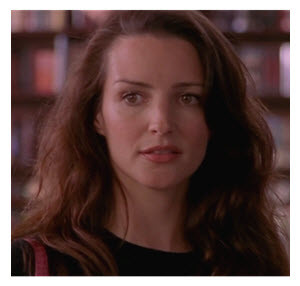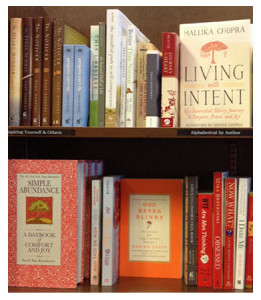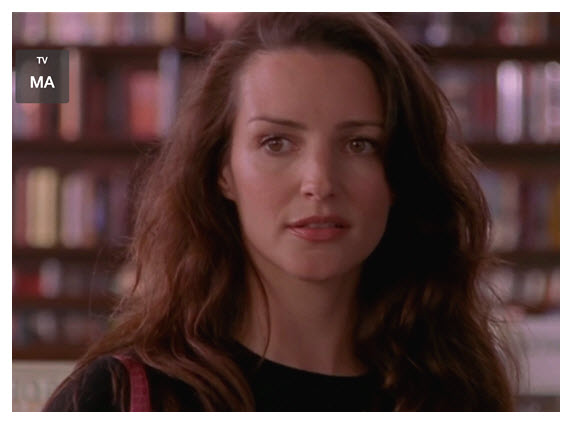Once, it was simply known as the self-help aisle, a section in your local bookstore where you might find guidance on becoming a more likable person, uncovering your true passion in life, meeting the man (or woman) of your dreams, losing weight and getting fit, or meeting the man of your dreams while losing weight and getting fit.
 If I close my eyes, I swear I can conjure Jamie Lee Curtis in leotards and a sweatband.
If I close my eyes, I swear I can conjure Jamie Lee Curtis in leotards and a sweatband.
At the very least, self-help or self-improvement provides a selection of suggestions for comforting ourselves in a chaotic world, with or without a side of chicken soup, as we make our journeys toward achieving material or emotional success, and ideally, simultaneous spiritual enlightenment.
And here I pause to recall a Sex and the City episode I have never forgotten: An embarrassed Charlotte goes in search of a book on starting over after divorce. Unfortunately, she finds herself on the receiving end of unsolicited counsel from a sobbing, overweight woman seated on a little stool in the “self-hell” aisle.
Not much of an endorsement, now is it… that woman, the very picture of what most of us don’t want to become — or so we are taught — fat, teary, and apparently, alone.
Rebranding Self-Help
Self-help?
I’m all for it. For that matter, in my own small way, I traffic in it as much as the next person these days, dishing out (veiled?) advice in the guise of self-discovery and commentary, earnestly hoping that what I may have learned offers some kind of value to someone other than myself. God knows, there’s certainly a market for self-improvement in all its forms… And though we may be loathe to admit it, who isn’t in need of some kind of help these days, eager to consume wisdom in as few steps as possible?
Yet I cringe at the mainstreaming (rebranding?) of self-help that seems as if it is distracting us from the very aspects of life that we are seeking — living profoundly, living meaningfully, and yes, living happily. I am convinced we would do a better job at all three if we could live less self-consciously and consequently, in a more “human” fashion. That would entail fewer expectations as to how living well or happily should look.
And so I find myself standing in front of what we now know as Personal Growth or Living Our Best Life, and the available options are dazzling or dizzying depending on your state of mind as, to me, the cure threatens to spread more contagion than the disease.
Pretty, Thin, Young…
One of the aspects of this growth market that I note as I stroll from section to section in an enormous “category” — the public face that is so important to making a sale is as gender-specific as ever. For the most part, books penned by men have cover photographs that reveal an average-looking person with or without glasses, with or without hair, and a wrinkled brow.
No problem.
On the other hand, photographs of female authors present flawlessly smooth skin, shiny hair, perfect teeth, slim bodies, and the appearance of being 40 or younger.
No surprise.
Even as I accept the fact that we all respond to what we consider attractive, I’m stymied by how the narrowing of accepted attractiveness persists in white-bread American culture. That we would be less willing to consider the counsel and experience of a woman of many years (much less color or size, except for Oprah) over one that appears to be cute, trim, young and white seems ill-advised, when what we really want is, in fact, that wisdom and experience that comes from living life.
 Sure, if we’re looking to lose weight at 40 while juggling a demanding job, a traveling hubby and two sets of twins, we might want the aspirational motivation of a calm, confident size 4 showing off her beautiful bod in a well-tailored dress. (Naturally, there is a clean kitchen and a brood of cheery kids staged in the scene behind her.) Likewise, if we’re 50 and starting to date again after divorce, a 40-something female with a twinkle in her pretty little eye may allow us to imagine our 50-something selves with the same self-confident attitude.
Sure, if we’re looking to lose weight at 40 while juggling a demanding job, a traveling hubby and two sets of twins, we might want the aspirational motivation of a calm, confident size 4 showing off her beautiful bod in a well-tailored dress. (Naturally, there is a clean kitchen and a brood of cheery kids staged in the scene behind her.) Likewise, if we’re 50 and starting to date again after divorce, a 40-something female with a twinkle in her pretty little eye may allow us to imagine our 50-something selves with the same self-confident attitude.
Then again, won’t we be feeling “less than” if we can’t possibly afford the necessary tweaks, we will never be a size 4, and our lives are more complicated than a set of checklists can accommodate?
Smart, Sexy, and… Photoshopped?
In that same Sex and the City episode, Carrie is soon to be styled and photographed for her upcoming book and she’s fretting over the cover image. What she wants? To look “smart, sexy and properly airbrushed.” My, but expectations “evolve” in a decade or more… Properly Photoshopped would be the term now, and most women don’t think twice about doing it.
And who could blame us? Isn’t this still the way we fundamentally value women, if not in entirety, to a large extent?
That is, at least until we can legitimize their aging by reaching the granny stage — Hello, Hillary Clinton — whereupon we finally stop remarking on a woman’s style or weight.
Of course I want to stay as pretty as possible, as young looking as possible, as thin as possible and in general, as attractive as possible for as long as I can. As I grow older, what I want above all else is to stay healthy, physically and mentally, and to be able to pay my bills. Beyond that, my most sincere wish is to make a difference. Even as I write this, I know these objectives war with the desire to remain “pretty, thin and young” — all of which I recognize as vital to a woman earning a living in this culture, in most roles, jobs and industries.
Best Self? Great Concept
Sometimes I think pop culture is keeping me in a perpetual state of “not good enough” — as if everything I am doing ought to be done better, faster, smarter or at least differently — in order to find “success.” The notion of self-help certainly plays into this, or rather, being one’s “best self.”
 Most days, I’m focused on just getting through; some nights (especially), the shadows of insufficiency come to rest and leave their dingy mark on my mood, still present when I awake in the morning. I wish I could walk away from it all — from the feeling that I will always be dogged by “not enough” — from not pretty enough to not tall enough to not thin enough and of course, as time marches on, not young enough. Grateful that “not smart enough” has never been a label that has been applied, I nonetheless disappoint myself in that arena as well; I may be considered “not successful enough” (by most measures) especially given all that once-upon-a-time “potential.”
Most days, I’m focused on just getting through; some nights (especially), the shadows of insufficiency come to rest and leave their dingy mark on my mood, still present when I awake in the morning. I wish I could walk away from it all — from the feeling that I will always be dogged by “not enough” — from not pretty enough to not tall enough to not thin enough and of course, as time marches on, not young enough. Grateful that “not smart enough” has never been a label that has been applied, I nonetheless disappoint myself in that arena as well; I may be considered “not successful enough” (by most measures) especially given all that once-upon-a-time “potential.”
My failings aside, real and imagined — I see my parenting as a success, at least in so far as I have launched two good young men, and the rest is now up to them. That sense of accomplishment (or more precisely, momentary relief) is not about the “self” at all, and perhaps that’s why it feels so much better. It is about family, about giving, about something that seems larger and leaves me feeling smaller in a way that strikes me as good, natural, and “right.”
The Business of Hope
Strolling that aisle — make that aisles (there was more than one) — I ultimately arrive at my destination, which is a single set of four shelves with career guides. There, to my annoyance, I am unable to locate what I am looking for. While I may be delighted that we have resources on comforting ourselves, managing stress, being more mindful, and seeking a more soulful, spiritual side — and as much as I am happy to pluck up a volume that may speak to me in some constructive fashion when I most need it — I would love to do so with less sense of comparison to an impossible standard of what those improvements in me ought to look like.
The motor behind all this industrious striving and related instruction?
Hope. Four unassuming letters, yet such a powerful word. Hope that we have enough time to do better, feel better, do more, be more, have more. We do so love to transact our daily business around hope, to tie up our efforts and investments in its manufacture, to nourish our tolerance for average hours and average days and above average struggles, counting on its fortitude.
Thankfully, although I am beyond a stage where hope seems to shine as brightly as it once did, capable of blocking out any vestiges of conflicting reality, nothing blackens the brightness of “meaning” as both a viable destination and a plausible path.
Ah… Our Definitions of Success
I long for the freedom that I have felt at other times and in other places, where instead of constant vigilance and worry over the size of my waist or the tautness of my skin, I am focused on the sharpening of my mind and the honing of my skills, and the ultimate delivery of my contributions.
And the fact that I feel so “unsuccessful” in the ways that contemporary culture continues to assess our value? The fact that I see the contradictions in the emphasis on our looks and likewise, the endless pursuit of self-fulfillment? The fact that I chide myself for being emotionally susceptible to the former while intellectually drawn to the latter?
Perhaps I can return to the self-help aisle and find guidance on how to merge conflicting belief systems. Or maybe I should be discerning and insist on questioning whatever I read or hear, and its pat interpretation. Perhaps I need to amp up my sense of humor (and take all of this less seriously). Or, I can do what our fictional heroine Charlotte does, like the other characters in this iconic series: I can honor the wondrous connections of love and friendship wherever they are created; I can step away from anything that makes me feel smaller; and I can resolve to remember that getting out in the world can bring moments of inexpressible joy.

Image of Charlotte: Sex and the City still from video.
You May Also Enjoy
So many voices compete to tell us our “shoulds.” I literally hate that! I, too, fight the scream of our larger culture, by whose standards I will never be a success. More important for me, is to define my own standards and also to surround myself with others who are supportive of my chosen priorities. I need the voices of those I trust to remind me that I am more than my size, greater than my bank account and have worth that is measured in meaning, not followers/fans.
Identifying sources of inspiration and cohorts that share similar values is the real treasure hunt. Outside of family and long-time friends, I’m often pleasantly surprised by where I find kindred spirits. Your voice of veiled advice often prompts me to think and evaluate and I like that!
Yes those kindred spirits do seem to help, Missy, I agree. 🙂
I’m reminded of this:
“I went to a bookstore and asked the saleswoman, ‘Where’s the self-help section?’ She said if she told me, it would defeat the purpose.”
― Steven Wright
tags: humor, self-improvement
Perfect!
There is so much that I love in this but you probably aren’t surprised by my writing that. Not only do I think that you and I are trying to come at similar issues from different angles, I so very much appreciate your enlarging the scope to a societal level. There is – for me at least – so much to rethink, so much to relearn…
I love your ‘rough around the edges’ post, Heather. It is very real and very richly written. I agree, we seem to be trying to work out some of the same issues.
Ah but it’s all part of ensuring that the economy keeps going, isn’t it? As long as we keep thinking we need improving, books, makeup, “super” foods will keep flying off the shelves, coaches and therapists will stay in business, our educational institutions will remain open, TV shows and movies that depict people who keep trying and screwing up will have fans…
Not bad in itself, I guess, except when so-called “problems” are created to make a buck off the insecure.
There are benefits to not being the ideal target audience anymore. Most of that stuff I can ignore…